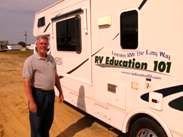Normally I would be discussing RV antifreeze used to protect the water system in your RV or boat from freezing, but today I want to talk briefly about automotive antifreeze. If I were the CEO of an automotive antifreeze company my entire focus would be on the need to regularly flush the coolant system and add new antifreeze to the vehicle cooling system.
I would do this for two reasons.
1) From a business standpoint I would do it to increase revenue. The average consumer doesn’t relate changing antifreeze in their vehicles like they relate to changing the engine oil on a regular basis. If they were educated on the benefits of changing the antifreeze in their vehicles my company profits would soar.
That brings me to reason number two.
2) The coolant system of any vehicle performs a very important job; to prevent the heat producing engine from overheating and quite possibly seizing up. When you don’t flush and replace the antifreeze periodically rust, scale and corrosion can build up in the radiator and engine coolant passages, and eventually result in an overheated engine.
Let’s talk a minute about what a vehicle coolant system is intended to do. First of all, if an engine did not have methods for transferring the heat that is produced through combustion and friction the hot metal parts would melt down and seize up. Heat that the engine produces is basically removed through the exhaust system and through the cooling system. All heat producing sections of an internal combustion engine need to be cooled, including the combustion chamber, heads, cylinder walls and the engine block itself. The way this is done is by circulating coolant around these heat producing areas of the engine. The coolant picks the heat up and releases much of it as it circulates through the vehicles radiator.
Water does a good job helping to cool an engine but it has some drawbacks. Most importantly it freezes quickly during cold winter temperatures. Water can also cause certain metals to rust and corrode over time. This is why the water in a vehicle cooling system is mixed with what we refer to as antifreeze. Glycol antifreeze does several things to help your engine:
1) It helps to lower the freezing point of water.
2) The corrosion inhibitors that are added help prevent scale and rust build-up in the cooling system.
3) It provides protection against boiling in the hot summer months.
4) Antifreeze helps keep the engine operating at its most efficient temperature regardless of operating conditions and outside temperatures.
When we don’t flush and replace the antifreeze at recommended intervals these chemicals start to break down and cannot perform the job as effectively as new antifreeze can. Just like used engine oil breaks down and needs to be replaced for maximum lubrication and cooling performance.
How many of you have ever witnessed a vehicle sitting along the side of a road with steam billowing out of the engine compartment from overheating? I cannot count the number of times I have seen this. Many times the cause is due to the failure of a part within the cooling system. If a radiator hose, heater hose, water pump, thermostat or fan belt fails the result is an overheated engine. Or, if the coolant system hasn’t been flushed and the antifreeze replaced for several years the result is an overheated engine. The bottom line is periodic inspections of the cooling system components, and flushing and replacing antifreeze at recommended intervals will add years of life to the vehicles engine and prevent untimely breakdowns.
Keep in mind that glycol antifreeze is poisonous to humans and pets and that it needs to be disposed of properly. You should follow the guidelines in your vehicle owner’s manual for flushing and replacing antifreeze and make sure you are using the proper type of antifreeze recommended for your particular vehicle.
Remember, getting here is supposed to be half the fun! Add the vehicle cooling system to your pre-trip inspection if you don’t already include it.
Happy RV Learning,
Mark Polk
RV Education 101
RV Online Training
Hi my name is Mark Polk
Mark & Dawn Polk

About
- Mark and Dawn Polk
- Mark Polk is a retired Army Chief Warrant Officer Three, specializing in wheeled and track vehicle fleet maintenance operations. In addition to owning and operating RV Education 101 since 1999, Mark also has a very extensive RV background working in RV sales, service and management. Dawn Polk is Mark’s wife and is RV Education 101’s Sales and Marketing director. After 3 years in RV sales, she left her position to help start RV Education 101. http://www.rveducation101.com
RV Training Products
Free Monthly RV 101 Newsletter
Visit our Sponsors
Copyright All Rights Reserved

We welcome you to LINK to this blog or any post within this blog. You may not copy the article in it's entirety and post. You may only use a small introduction of the material with an unaltered clickable link. Full attribution must be given by using UNALTERED CLICKABLE links in addition to giving FULL credit in plain view to Mark Polk and RV Education 101 with a SPECIFIC CLICKABLE link to the ORIGINAL content. You may not claim any of this content as your idea. Other unauthorized duplication and/or use of this material without the express written consent of Mark Polk is strictly prohibited.
Blog Archive





